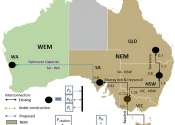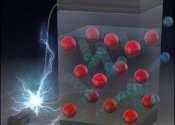Charting a cost-efficient path to a renewable energy grid for Australia
A model charts the most cost-efficient path to a fully renewable electricity grid for Australia.
8 hours ago
0
3
Energy & Green Tech

A model charts the most cost-efficient path to a fully renewable electricity grid for Australia.
8 hours ago
0
3
Energy & Green Tech

Much of Alaska is empty—of humans, at least. Vast tundra and forest separate cities and villages, dividing the state into more than 150 isolated power grids. The largest of these grids, known as the Railbelt, carries 70% ...
9 hours ago
0
5
Energy & Green Tech

A record-breaking heat wave is broiling parts of Asia, helping drive surging demand for cooling options, including air-conditioning.
16 hours ago
0
1
Energy & Green Tech

Charge-recharge cycling of lithium-super-rich iron oxide, a cost-effective and high-capacity cathode for new-generation lithium-ion batteries, can be greatly improved by doping with readily available mineral elements.
May 2, 2024
0
43
Energy & Green Tech

In sub-Saharan Africa, over 600 million people (more than 50% of the population) are without access to electricity. Malawi has one of the world's lowest electricity access rates—just 14.1% of the total population have access ...
May 2, 2024
0
28
Energy & Green Tech

Microsoft and Canada's Brookfield Asset Management have struck an agreement for the development of renewable energy that could make one of the biggest corporate purchases of green energy to date, the companies said on Tuesday.
May 2, 2024
0
14
In physics, energy (from the Greek ἐνέργεια - energeia, "activity, operation", from ἐνεργός - energos, "active, working") is a scalar physical quantity that describes the amount of work that can be performed by a force, an attribute of objects and systems that is subject to a conservation law. Different forms of energy include kinetic, potential, thermal, gravitational, sound, light, elastic, and electromagnetic energy. The forms of energy are often named after a related force.
Any form of energy can be transformed into another form, but the total energy always remains the same. This principle, the conservation of energy, was first postulated in the early 19th century, and applies to any isolated system. According to Noether's theorem, the conservation of energy is a consequence of the fact that the laws of physics do not change over time.
Although the total energy of a system does not change with time, its value may depend on the frame of reference. For example, a seated passenger in a moving airplane has zero kinetic energy relative to the airplane, but non-zero kinetic energy relative to the Earth.
This text uses material from Wikipedia, licensed under CC BY-SA